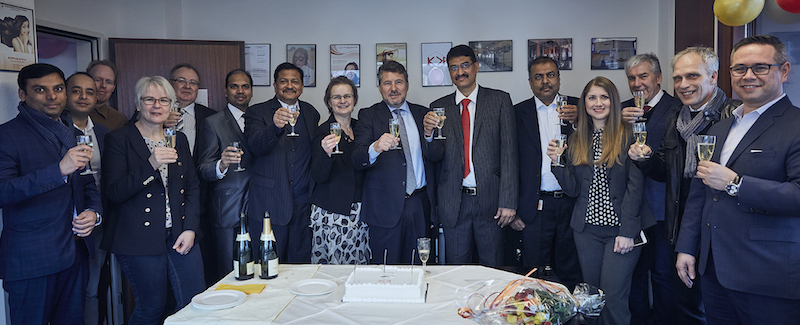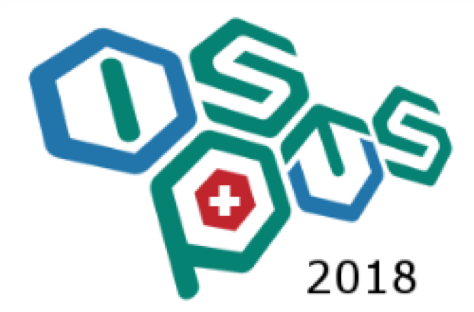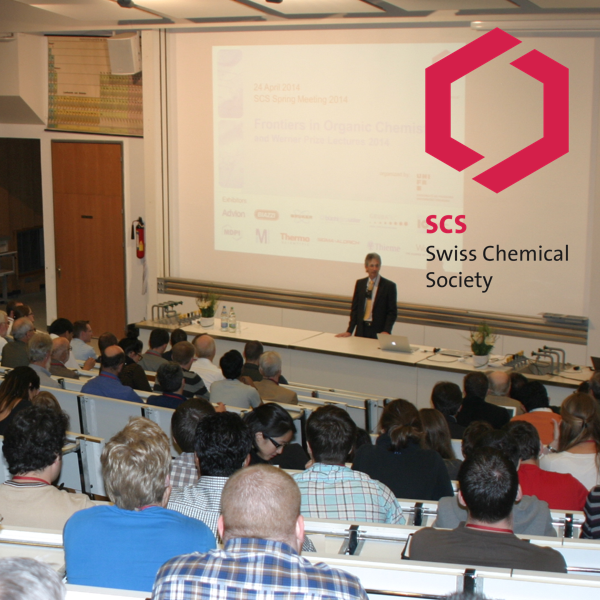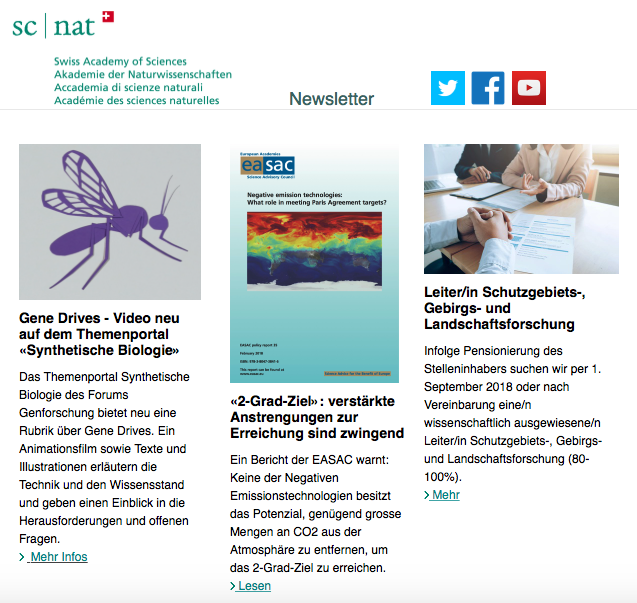Newsletter SCNAT, February 2018
Gene Drives - Video neu auf dem Themenportal «Synthetische Biologie»
Das Themenportal Synthetische Biologie des Forums Genforschung bietet neu eine Rubrik über Gene Drives. Ein Animationsfilm sowie Texte und Illustrationen erläutern die Technik und den Wissensstand und geben einen Einblick in die Herausforderungen und offenen Fragen.
Mehr Infos
«2-Grad-Ziel»: verstärkte Anstrengungen zur Erreichung sind zwingend
Ein Bericht der EASAC warnt: Keine der Negativen Emissionstechnologien besitzt das Potenzial, genügend grosse Mengen an CO2 aus der Atmosphäre zu entfernen, um das 2-Grad-Ziel zu erreichen.
Lesen
Leiter/in Schutzgebiets-, Gebirgs- und Landschaftsforschung
Infolge Pensionierung des Stelleninhabers suchen wir per 1. September 2018 oder nach Vereinbarung eine/n wissenschaftlich ausgewiesene/n Leiter/in Schutzgebiets-, Gebirgs- und Landschaftsforschung (80-100%).
Mehr
Initiative Naturhistorische Sammlungen in der Schweiz
Der Workshop hat zum Ziel, einen Entwurf eines Grundlagenberichtes über Bedeutung, Zustand und Herausforderungen für naturhistorische Sammlungen in der Schweiz sowie vorgeschlagene Massnahmen für eine schweizweite Initiative zu diskutieren.
Weitere Infos
Kulturerbejahr 2018: Natur und Kultur im Dialog; Biodiversität im Freilichtmuseum Ballenberg
Der Mensch prägt die Landschaft seit Jahrtausenden. Seine Aktivitäten und Bauten haben viele neue Lebensräume geschaffen, aber auch zahlreiche Tier- und Pflanzenarten verdrängt. Auf dieser Führung durch die vielfältige Kulturlandschaft im Freilichtmuseum Ballenberg entdecken Sie zusammen mit Fachleuten solche Lebensräume und lernen ihre Bewohner kennen. Die Führung wird vom Freilichtmuseum Ballenberg und dem Forum Biodiversität Schweiz organisiert.
Mehr infos
"Die Wissenschaft braucht guten Journalismus!"
Save-the-date: 25. Mai 2018, 10-12 Uhr
Über den Zustand der Medien in der Schweiz, neue Ansätze und die Handlungsmöglichkeiten der Wissenschaft.
Ort: Restaurant zum Äusseren Stand Bern
Publikum: Delegierte der SCNAT, Mitgliedsorganisationen und Interessierte
Komplexes attraktiv vermitteln: CAS Wissenschaftsjournalismus
Wie lassen sich komplexe Zusammenhänge in Forschung und Wissenschaft attraktiv und verständlich vermitteln? Wie können Sie Inhalte aus Ihrem Fachgebiet einem breiten Publikum zugänglich ma-chen? Im CAS Wissenschaftsjournalismus am MAZ leiten wir Sie auf diesem Wege an. Start: 3. September 2018. Anmeldeschluss: 30. Juli 2018.
Mehr Infos
weitere Aktivitäten der SCNAT
Kumar Organic Focuses Growth! New Office Opened in Basel
Kumar Organic Products Ltd, company, the leading provider of high-performance specialty chemicals manufacturer is pleased to announce the opening of it’s yet another new branch in Basel city Switzerland to add to its extending global sales and to meet the market demands. New office expansion enables Kumar Organic Products to provide better services and customer support in Personal Care, Cosmetics and Pharma market in Europe
In addition to the existing Branch office in Luton, Bedfordshire UK, the launch of a local team, responsible for all product distribution and customer technical support, is designed to bring the Kumar’s products closer to its customers and give them regionally based Kumar’s contacts.
The decision to assume distribution directly was a logical step in our international market expansion strategy. In order to be more responsive to the new and diverse needs of our customers who have always been at the centre of company's goals, we intend to complement our range of products with highly professional and specialized technical support. With the strong leadership in Antibacterial & Hair care segment, company has taken another leap in launching products under preservative and emollients segment of Green Technology with REACH regulations complied. Company is focusing on greater cover for the Personal care actives markets in Eastern Europe, Baltic Nations and CIS countries as well.
Basel area is also affluent with Cosmetic & Pharma giants (Fortune 500 companies). We expect full support from our partners so that we can make it great success. To strenghten the link to Switherland, Kumar Organic became a corporate member of the Swiss Chemical Society for at least the next three years.

Kumar Organic Products Limited
Kumar Organic Products is one of the fast growing research based manufacturers and supplier of cosmetic active ingredients, specialty chemicals headquartered in Bangalore, Karnataka, India and has successfully carved its niche as, the strategic partner to the manufacturers of the cosmetics industries across globe. Established in the year 1993, the company with the focus of achieving its objective and continuous growth has grown to employ about 550 dedicated employees with four manufacturing sites in India. The company subsidiary offices are located in UK, Europe, North America, Singapore and covering various other countries by company’s global distributor partners. Company is accredited with USFDA, CEP, MHRA - UK, COFEPRIS, ISO 9001 & 14001 certifications.
For more information, visit www.kumarorganic.net
MediaContact
B. N. Kawari – General Manager (International Sales)
Kumar Organic Products Europe AG Switzerland
David Spichiger, SCS
26.02.2018
ISPTS 2018, November 6-9, 2018: Registration open
 FHNW Campus Muttenz, Switzerland
FHNW Campus Muttenz, Switzerland
6-9 November 2018
(10-11 November: social/technical program)
Website: http://ispts2018.ch
The International Symposium on Persistent Toxic Substances (ISPTS) is a well‐known international conference series hosted in prominent academic institutions around the globe.
Scientific program
- Sources, transport and fate of PTS
- Emerging contaminants of concern
- Toxicology and eco-toxicology of PTS
- Analytical and bioanalytical methods
- Fate and toxicity modelling
- Risk assessment of PTS
- Mitigation and remediation of PTS
- Environmental pollution and health
- Karl Fent tribute career
Plenary Speakers
- ZongweiCai(HKBU China)
- Karl Fent (FHNW/ETH Switzerland)
- Heidelore Fiedler (Örebro University, Sweden)
- Janet Hering(Eawag/ETH, Switzerland)
- Kevin Jones (Lancaster University, UK)
- Kris McNeill (ETH, Switzerland)
- Shane Snyder (University of Arizona, USA)
- John Sumpter(Brunel University, UK)
Keynote Speakers
- Thomas Braunbeck (University of Heidelberg, Germany)
- DespoFatta-Kassinos(University of Cyprus, Cyprus )
- Juliane Hollender(Eawag/ETH, Switzerland)
- Nicolas Kalogerakis(Technical University of Crete, Greece)
- Arata Katayama (Nagoya University, Japan)
- ShuangJiang Liu (Chinese Academy of Sciences, China)
- Rainer Meckenstock (University of Duisburg-Essen, Germany)
- Laura Sutter-Dick (FHNW Switzerland)
- Martin Röösli(Swiss TPH, Switzerland)
- Shu Tao (Peking University, China)
- Thomas Ternes(BfG, Germany)
- Aijie Wang (Chinese Academy of Sciences, China)
- Thomas Wintgens (FHNW, Switzerland)
- Xiaowei Zhang (Nanjing University, China)
Conference Fees
- Early bird PhD 250 CHF
- PhD 300 CHF
- Early bird regular 480 CHF
- Regular 550 CHF
- Industrial 700 CHF
Early bird deadline 01.09.2018
Key Dates
Registration/Abstract
submission start 15.02.2018
https://ispts2018.ch/index.php/registration/abstracts-submission
Deadline Abstract
submission 15.06.2018
Notification of acceptance 15.07.2018
David Spichiger, SCS
26.02.2018
EuCheMS Brussels News Updates, February 2018
EUROPEAN HIGHLIGHTS
2018 European Year of Cultural Heritage – #EuropeForCulture
The aim of the European Year of Cultural Heritage is to encourage more people to discover and engage with Europe’s …
Read more
EuCheMS responds to consultation to limit industrial trans fats intakes in the EU
EuCheMS submitted a response, prepared by EuCheMS Food Chemistry Network, to this open consultation, calling for more research to determine …
Read more
EuCheMS response to open consultation on explosives precursors
Explosives precursors are chemical substances which can be misused to manufacture home-made explosives. In 2013, recognising the threat posed by …
Read more
First European Education Summit: laying the foundations for a European Education Area
The Commission hosted the first European Education summit in Brussels on 25th January. It laid out its plans to create …
Read more
First-ever Europe-wide strategy on plastics
On 16th January, the Commission adopted the first Europe-wide strategy on plastics, which will protect the environment from plastic pollution …
Read more
Safer drinking water for all Europeans
The right to access essential services of good quality, including water, is one of the principles of the European Pillar …
Read more
GMO opt-outs
Some genetically modified organisms can be authorised for use in the EU in foods or feed or for cultivation within …
Read more
INNOVATION & ENTREPRENEURSHIP
Clean energy innovation
A non-legislative draft report on how to boost clean energy innovation and make the energy system more efficient and affordable …
Read more
CONSULTATIONS & ROADMAPS
Consultation on EU funds in the area of investment, research & innovation, SMEs and single market
The European Commission is consulting on the structure and content of the Framework Programme which will succeed Horizon 2020, through …
Read more
Consultations on food safety
The Commission has launched two more consultations on food safety: : reduction of sugar in the food EFSA is seeking …
Read more
Public Consultation on the transparency and sustainability of the EU risk assessment in the food chain
The General Food Law Regulation (EU rules on food and feed safety along the production chain) is the cornerstone of …
Read more
Public consultation on EU funds in the area of strategic infrastructure
In 2018, the Commission will make comprehensive proposals for the next generation of financial programmes for the post-2020 Multiannual Financial …
Read more
David Spichiger, SCS / EuCheMS.eu
20.03.2018
Invitation to the SCS General Assembly 2018
 The Board of Directors invites all members of the Swiss Chemical Society and the delegates of its associated societies to join the 28th General Assembly. April 6, 2018, 13.00-13.30h. The assembly takes place during the lunch break of the SCS Spring Meeting 2018, «Bio-Inspired Chemistry».
The Board of Directors invites all members of the Swiss Chemical Society and the delegates of its associated societies to join the 28th General Assembly. April 6, 2018, 13.00-13.30h. The assembly takes place during the lunch break of the SCS Spring Meeting 2018, «Bio-Inspired Chemistry».
University of Neuchâtel, Aula des Jeunes-Rives
Espace Louis-Agassiz 1, 2000 Neuchâtel
Provisional Agenda
- Welcome and approval of the agenda
- Election of the vote counters
- Minutes of the 27th General Assembly from April 21, 2017 in Bern (published in CHIMIA 6/2017, A394)
- Annual report 2017 (published in CHIMIA 1-2/2018)
- Financial statement 2017 and audit report
- Discharge the Board
- Elections
- Fees, news and strategic projects
- Outlook 2018/19
- Varia
Motions to the assembly can be submitted until March 23, 2018 to . A summary of the financial statement 2017 will be published on the website after the formal audit.
Swiss Chemical Society (SCS)
Dr. Alain De Mesmaeker
David Spichiger President Executive Director
David Spichiger, SCS
08.02.2018
Page 85 of 299

